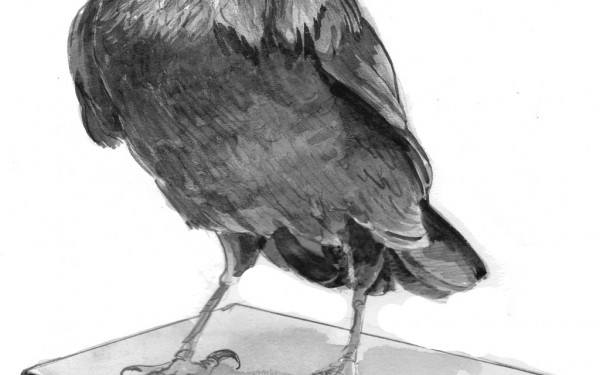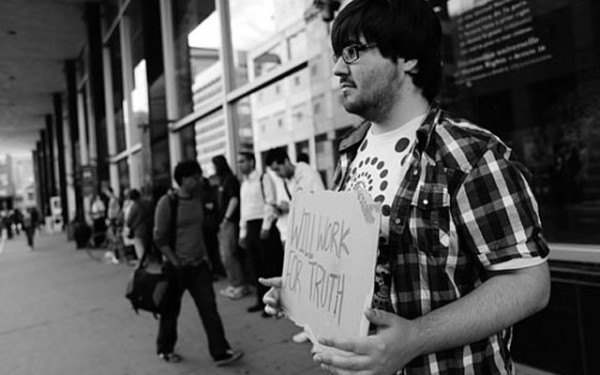Interview with Die Zeit’s Carolin Emcke
Carolin Emcke is an author, political theorist and war correspondent with German newsmagazine Die Zeit. She has reported from Iraq, Afghanistan, Gaza and Haiti, where she pondered what happens to truth and certainty in wartime. She spoke with The Link in advance of her panel appearance at the Blue Metropolis International Literary Festival. The following is a transcript of that interview.
What kind of censorship have you encountered?
I usually really have to deal with direct, concrete state intervention into my own work, meaning I may not even be allowed to enter a country in order to report on what’s going on. There’s various answers. It has been extremely difficult to travel to Northern Iraq during the regime of Saddam Hussein; it has been very difficult—actually, impossible—to enter Gaza during last year’s military campaign. So if you had asked me personally, I’m most of all concerned with such forms of direct censorship, I would say there’s also indirect censorship, I would say that the American way of inviting journalists to be embedded [inside a military unit], I would call that an extremely intelligent form of censorship. By just integrating journalists into combat units, I would say had an enormous impact on the kind of writing or filming of the journalists, there have been wonderful, critical, exceptions. But I would say generally it’s extremely difficult to write critical about the people who are also in charge of protecting your life when you travel with them, so these are the forms of censorship that I have to deal mostly with.
I’ve never been embedded, I made the decision not to, just because I have experienced, once that I more or less accidentally ended up with a fighting unit during a particular combat situation in Northern Iraq, actually in 2003, and while lying with a group of people under attack, I was under attack as they were, and I realized that I actually wanted my soldiers to kill the soldiers on the other side. Basically because that meant that they wouldn’t kill me. I don’t think I thought that was because I was a particularly mean person, but I think it’s just the natural thing to do in a moment of existential threat, you rather want your people to win than the other side, and so I think that the whole myth of neutrality is lost in such situation, so I just don’t want to get into those situations. The focus of my work always has been to look at the lives and conditions of life of civilian populations, so I’m not a war reporter in the sense that I, you know, mostly write on armies or the military development.
I write on civilians, refugees, and those who are victims of war and not the ones that are actually in the combat, so you can say that’s an easy way out of that conflict, but it is a way to look at another side of war than by focusing on the weapons.
Has it become more difficult for journalists to do their jobs?
I’m doing this since more than 10 years, and I wouldn’t say it’s become more easy or more difficult, I think one aspect has become much more difficult. In some Arab countries, journalists are not perceived as independent anymore, but are more sort of profiled as belonging to the Western world or white or non-Muslim, and that has been, I mean, for me, personally tremendously disconcerting, a) because I don’t perceive myself that way, but b) because it meant that in certain countries you couldn’t really travel anymore unless you wanted to run a really high risk of getting kidnapped for ransom or getting killed in Iraq or in Afghanistan.
Have you ever felt the need to censor your own work?
I think as a German writer, I think there’s only one area that’s highly sensitive not in the sense that anyone would censor you, but in the sense that you yourself are very, very careful I think about framing just any sentence and any thought, and that is Israel. And, as a young German writer, I think for my generation we’re all driven by, you know, the consciousness of the Shoah, and of the responsibility of the next German society to never, ever have anything like Auschwitz happen again, so I think there’s an enormous, you know, caution as a German to criticize Israeli politics, that’s not censorship, that’s sensibility with historic knowledge, but I think that’s the only real topic where the German public fear one has to be careful.
How do you deal with what you witness?
I think one doesn’t. I think what you see and experience is just overwhelmingly upsetting and you don’t come to terms with it. I could say that there is something else that doesn’t really compensate but that gives you the energy to cope with it. Very, very often, in such areas of death and destruction, it’s particularly beautiful and people are incredibly hospitable and generous, actually particularly in poor countries, people are incredibly generous. So you feel enriched in these areas and you feel honoured by many of the conversations and encounters with normal people that you have, so that doesn’t stop the other experiences from haunting you, but I think it’s a force for joy and gratefulness that I think is what allows you to continue to do it.
Would you consider yourself an advocacy journalist?
We don’t have that term, I [just] heard that for the first time. No, I mean, it seems strange to me. I’m highly critical of concepts such as objectivity and neutrality, but I’m, you know, not an advocate of any group, I’m definitely an advocate of human rights, so I think what I will defend and what I’ll never be neutral about is, you know, the Geneva conventions, international standards of law and human rights. Whoever undermines these I will criticize them, whether that is members of my country or another country, I don’t really care. So in that sense I would say I’m trying to be independent, I’m trying to be self-selective about my own subjectivity, and I’m cautious about terms as neutrality and objectivity.
Is it difficult to get people to open about their experiences, especially in times of war?
It always surprised me, but actually people want you to write about what the experience as injustice. People beg you to tell their stories, not because they were so naïve that they would think that because some unknown German writer writes something that their lives would immediately change, but because they have experienced such long-term structural exclusion that the sheer fact that someone sits down with them, listens, and says, what you’ve experienced is wrong, that already makes a huge difference to them. And I think that is different in regions of natural crises, or natural disaster. I was recently in Haiti, and no one wanted to talk to me there, all they wanted was food or a tent, but this was the first time in my life that that happened. Usually, people really want to share their experience, and I think the difference between a natural disaster and a political disaster is that in a natural disaster, their critique doesn’t have an addresee, I mean there’s nobody to criticize for what’s happened to them.
Carolin Emcke will be speaking at Blue Metropolis’s “Writers in Peril: Censorship” panel on April 23 at 6:30 p.m in the Delta Centre-Ville’s Verrière AB (777 University St.). Admission is $10.






_600_375_90_s_c1.jpg)